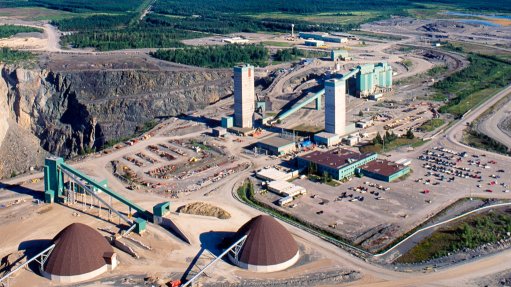Sustainability efforts gain momentum
The Canadian mining industry has made significant progress in the last 10 to 15 years in the realm of environmental and social responsibility, reports Mining Association of Canada (MAC) president and CEO Pierre Gratton.
“We have seen our members and much of the industry embrace the principles of sustainability and put them into practice by adopting effective corporate social responsibility (CSR) initiatives, including MAC’s Towards Sustainable Mining (TSM) programme, the International Council on Mining and Metals’ (ICMM’s) Sustainable Development Framework and the Global Reporting Initiative (GRI),” he says.
Gratton states that these are just a few of the many voluntary standards Canadian mining companies have adopted as a means of ensuring they are adhering to the best practices in sustainability and as a means of publicly reporting their progress.
“Here in Canada, we have developed the TSM programme, with participation mandatory for all MAC members,” says Gratton.
He explains that, in terms of the programme, members commit to a set of guiding principles and yearly report their performance for all Canadian operations against a set of performance indicators. TSM assessments take place at the facility level to ensure that management systems are in place, with results externally verified every three years. New MAC members have four years to start publicly reporting. This gives them time to train facility staff on the programme’s requirements and the reporting framework.
At present 20 companies, made up of 59 facilities, publicly report their TSM performance.
“Since it was established, we have seen notable advancements in the way our members engage with their communities, limit environment impacts and increase energy efficiency at their facilities,” says Gratton.
For example, through TSM, companies such as Barrick Gold and Inmet, have established stakeholder engagement panels to work more closely with their communities of interest. MAC members are also working with educational institutions and governments to establish training programmes, such as the British Columbia Aboriginal Mine Training Association, to help increase Aboriginal employment in the industry.
Addressing the challenges of biodiversity conservation has become a top priority for many Canadian miners, including Vale (formerly Inco) which has been involved in the regreening of Sudbury programme since the late 1970s. Through this programme, more than 9-million trees and shrubs have been planted, and 3-million seedlings have been raised in company-owned greenhouses.
Internationally, some Canadian mining companies have partnered with nonprofit organisations to draw on each other’s expertise to generate better community benefits in developing countries.
An example is Iamgold and Plan Canada’s project in Burkina Faso to establish a vocational training school that aims to help local youth transition into professional careers and out of the grips of poverty.
Gratton says that, overall, there is a strong appetite among mining companies to improve their sustainability efforts and to follow best practices in CSR.
“The biggest challenge is turning that desire into action and meaningful results. CSR is vast and can be daunting for those not knowing where to start. This is why the industry has been so responsive to the TSM programme. We equip companies with the training, protocols, guidance and tools they need to make meaningful change at the very root of their business – at the facility level,” says Gratton.
He explains that TSM helps companies effectively overcome challenges through: engagement with communities of interest; understanding gaps in sustainability efforts; employee motivation and training; getting the commitment of senior management; internal capacity-building; and measuring success.
“The main achievement of TSM is that our members have seen their performance improve in all of the programme’s indicators since 2004, which affirms that the programme is working. Our members are seeing measurable results from their participation in TSM, and have generated positive outcomes related to lessoning their environmental impact and enhancing their engagement with surrounding communities,” says Gratton.
He adds that TSM has been recognised by independent experts as a ‘best in class’ initiative across all industry sectors in Canada and within the mining industry around the world.
“Notably, TSM has been acknowledged as an important industry initiative by several leading organisations, including Five Winds International, Canadian Business for Social Responsibility and Sustainalytics. The programme has been recognised with awards from the Globe Foundation for environmental excellence, and the Prospectors and Developers Association of Canada for environmental and social responsibility.”
TSM has also recently moved beyond MAC’s membership. In 2010, the Mining Association of British Columbia became the first provincial association to formally adopt all aspects of the programme and is currently working towards implementation. MAC is also in conversation with other associations, both within Canada and internationally, that are considering a similar approach.
“TSM is continuously evolving to meet the needs and priorities of MAC’s members and its communities of interest. Last year, MAC introduced two new performance elements – biodiversity conservation management, and safety and health. These are the first additions since TSM began in 2004. By the end of 2013, all MAC members will publicly report their performance under these new elements,” says Gratton.
In 2008, the membership adopted a framework for mine closure. This framework includes commitments to work with com- munities in developing closure plans, forming strategies to mitigate the socioeconomic impacts of mine closure, and planning for long-term economic development.
“Since the framework’s development, tech-nical experts from operations across the country have been working together to develop criteria to measure performance in mine closure. Through consultation with TSM’s Community of Interest (COI) advisory panel, the membership is currently developing a protocol to address this important issue,” explains Gratton.
He reports that the association’s members stand out for their commitment to strong environmental and social practices.
“A growing number of companies, including Inmet Mining, Iamgold, Teck Resources, HudBay Minerals and Agnico-Eagle Mines, are proactively applying TSM at their overseas operations. Applying TSM internationally is a good way for companies to demonstrate that they operate their international mines to the same standard as their Canadian facilities,” says Gratton.
He adds that, in addition to TSM, Canadian mining companies typically follow many voluntary standards and frameworks as part of their international CSR.
“TSM’s primary objectives are to drive performance improvement and, through demonstration of this improvement, to build trust with the mining sector’s communities of interest. To achieve these objectives, the membership will continue to work with the COI advisory panel to understand the needs and priorities of Canadians.
“MAC will ensure that the programme remains flexible and able to adapt to emerging issues and to incorporate current best practices. The membership reviews the requirements of the programme on an ongoing basis to ensure it remains relevant and continues to encourage performance improvement.
“Ultimately, MAC would like to see the programme extend beyond the membership and be implemented at as many mining operations as possible. To achieve this goal, MAC will continue to discuss the benefits of TSM with other associations and individual companies,” says Gratton.
Article Enquiry
Email Article
Save Article
Feedback
To advertise email advertising@creamermedia.co.za or click here
Press Office
Announcements
What's On
Subscribe to improve your user experience...
Option 1 (equivalent of R125 a month):
Receive a weekly copy of Creamer Media's Engineering News & Mining Weekly magazine
(print copy for those in South Africa and e-magazine for those outside of South Africa)
Receive daily email newsletters
Access to full search results
Access archive of magazine back copies
Access to Projects in Progress
Access to ONE Research Report of your choice in PDF format
Option 2 (equivalent of R375 a month):
All benefits from Option 1
PLUS
Access to Creamer Media's Research Channel Africa for ALL Research Reports, in PDF format, on various industrial and mining sectors
including Electricity; Water; Energy Transition; Hydrogen; Roads, Rail and Ports; Coal; Gold; Platinum; Battery Metals; etc.
Already a subscriber?
Forgotten your password?
Receive weekly copy of Creamer Media's Engineering News & Mining Weekly magazine (print copy for those in South Africa and e-magazine for those outside of South Africa)
➕
Recieve daily email newsletters
➕
Access to full search results
➕
Access archive of magazine back copies
➕
Access to Projects in Progress
➕
Access to ONE Research Report of your choice in PDF format
RESEARCH CHANNEL AFRICA
R4500 (equivalent of R375 a month)
SUBSCRIBEAll benefits from Option 1
➕
Access to Creamer Media's Research Channel Africa for ALL Research Reports on various industrial and mining sectors, in PDF format, including on:
Electricity
➕
Water
➕
Energy Transition
➕
Hydrogen
➕
Roads, Rail and Ports
➕
Coal
➕
Gold
➕
Platinum
➕
Battery Metals
➕
etc.
Receive all benefits from Option 1 or Option 2 delivered to numerous people at your company
➕
Multiple User names and Passwords for simultaneous log-ins
➕
Intranet integration access to all in your organisation


















